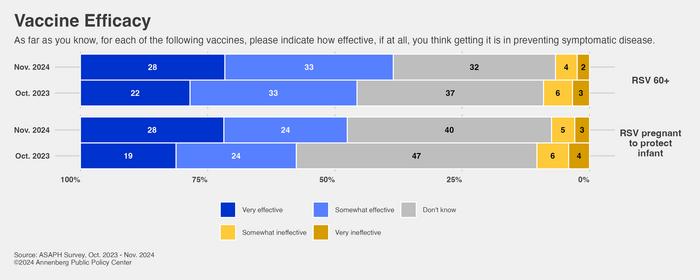PHILADELPHIA – In November 2024, the Annenberg Public Policy Center (APPC) released findings from its latest health survey, revealing a notable increase in public acceptance of vaccines designed to protect against respiratory syncytial virus (RSV). RSV vaccines have been made available to newborns and older adults over the past year, and a survey of U.S. adults indicates a significant shift in perception surrounding their effectiveness. The survey highlights that 52% of U.S. adults now believe the vaccine for pregnant individuals is effective, rising from 42% just a year earlier. Similarly, confidence in the effectiveness of the RSV vaccine for older adults has climbed from 54% to 61% during the same period.
The apparent increase in the perceived effectiveness of these vaccines has occurred even as the country had largely avoided the severe illness patterns seen in previous winters, particularly the alarming “tripledemic.” This term refers to the simultaneous peaks of flu, COVID-19, and RSV during the winter of 2022-2023, a situation that overwhelmed many healthcare facilities across the nation and led to substantial mortality. As of December 20, 2024, the Centers for Disease Control and Prevention (CDC) reported moderate levels of respiratory illness, although the flu season was becoming pronounced, with an uptick in activity noted across various regions.
Interestingly, the rise in acceptance of RSV vaccinations coincides with political scrutiny regarding vaccine safety and efficacy, particularly with the appointments of several nominees to health policy positions within the incoming administration. Prominent figures, such as Robert F. Kennedy Jr., have publicly questioned the safety of vaccines, casting shadows over public trust in vaccination programs. Despite this backdrop of skepticism from high-profile individuals, public sentiment appears to trend positively towards vaccination efforts.
The findings from the APPC survey were collected through a nationally representative panel of 1,771 U.S. adults, providing a robust data set with a margin of error of ± 3.3 percentage points. The survey methodology suggests a careful collection and analysis of public opinion regarding vaccination, especially amid ongoing discussions about health policy and misinformation in the digital age.
The survey also hints at a potential plateau in vaccine hesitancy, a pattern observed in recent years amidst rising concern about the public’s acceptance of vaccines overall. To that end, several key metrics from the November survey demonstrate that public confidence in vaccinations has either risen slightly or remained steady across a selection of vaccines. For example, 86% of participants perceive the measles, mumps, and rubella vaccine (MMR) as safe, an increase from 81% reported a year prior. Additionally, the flu vaccine maintains a positive safety perception level at 83%, with the Covid-19 vaccine holding steady at 65%.
Moreover, the survey suggests that increasing public awareness of vaccination importance is evident, especially when it comes to children. With nine out of ten respondents asserting it is important for parents to vaccinate their children, the data reflects a strong consensus on the necessity of vaccines. This sentiment persists despite negative narratives and misinformation propagated in various media channels.
The disparity in perceptions between the seasonal flu shot and the Covid-19 booster further underscores public sentiment. The recent survey illustrates that a substantial proportion of adults view the flu shot as more effective in preventing severe disease compared to the Covid-19 booster. Specifically, 75% believe the flu vaccine significantly reduces the risk of severe flu cases, whereas only 55% share a similar belief regarding the Covid booster. The familiarity and long-standing acceptance of the flu vaccine contribute to this prevailing viewpoint.
In investigating vaccination habits, the survey also highlights a behavioral divergence between flu shots and Covid-19 boosters. Slightly over half of the respondents reported either having received the flu shot or expressed a strong likelihood of doing so. In contrast, fewer individuals—38%—indicated they had received or plan to receive the Covid-19 booster. Such trends reinforce the conclusion that public health messaging may need to recalibrate to enhance understanding and acceptance of newer vaccinations.
An intriguing aspect of the survey showed that many adults recognize the value of the flu vaccine in reducing infection severity rather than outright prevention. This notion has contributed to a growing awareness, with reported understanding of the flu vaccine’s role in minimizing illness increasing from 48% to 54%.
As public understanding of flu and its implications evolves, so too has the knowledge surrounding the flu shot. For example, 80% of surveyed individuals know the effectiveness of the seasonal flu vaccine can vary yearly, allowing for a more nuanced understanding of vaccination. However, despite this knowledge, there is still a noteworthy segment of the public that doubts the vaccine’s efficacy this season compared to last.
While the APPC findings indicate growing acceptance of vaccinations amidst political discourse skepticism, they also reveal enduring knowledge gaps. Public belief in the need for annual flu shots remains strong, with the majority recognizing the flu shot as the best defense against illness. Yet, only 42% believe that everyone aged six months and older should receive a flu vaccination, suggesting a potential area for further educational outreach.
In conclusion, the latest survey data from the Annenberg Public Policy Center showcases a complex landscape of public opinion concerning vaccines, particularly in the context of RSV. As vaccine acceptance appears to rise amid ongoing health challenges and political uncertainty, health communicators will face the ongoing challenge of strengthening public trust and understanding of vaccination benefits. Continued exploration and communication around vaccine safety, efficacy, and necessity will be critical in fostering a society more willing to embrace healthcare interventions that can save lives.
Subject of Research: Public Perception of RSV Vaccines
Article Title: Growing Acceptance of RSV Vaccines Among U.S. Adults: A Shift in Public Perception
News Publication Date: November 2024
Web References:
References:
Image Credits: Annenberg Public Policy Center
Keywords: RSV, vaccines, public health, vaccine acceptance, Annenberg Public Policy Center, surveys, flu shot, Covid-19 booster, public opinion, health policy.




